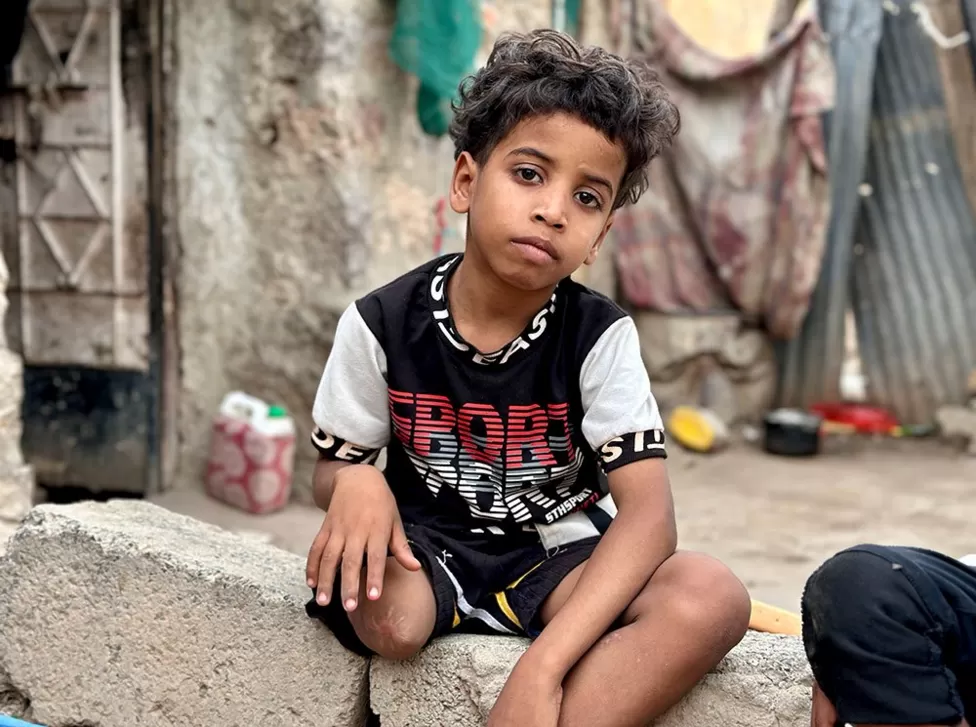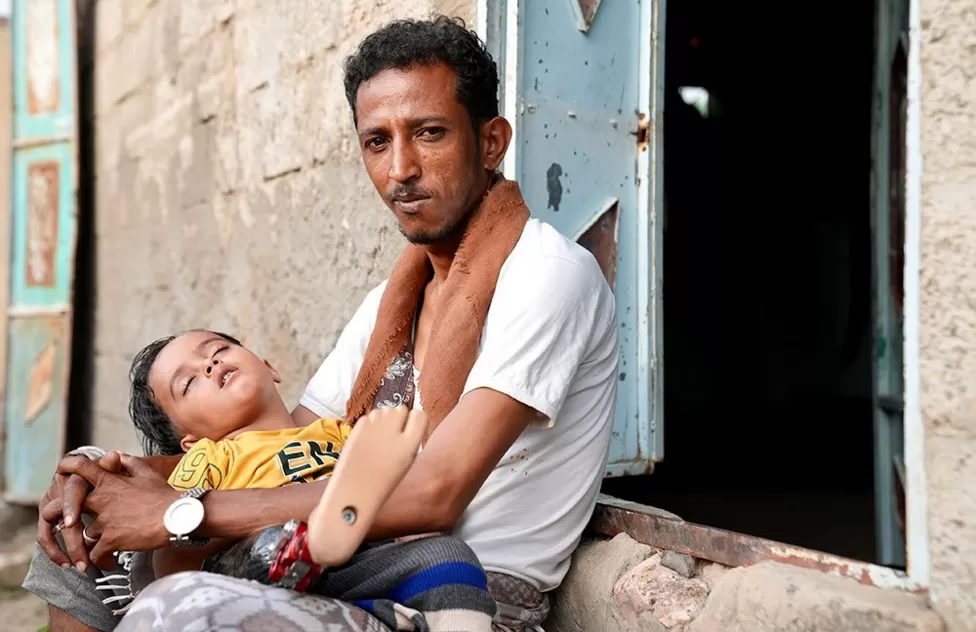Yemen: The children of a unforgotten war

Suffering might have an address on al-Rasheed Street, in Taiz, a Yemeni city surrounded by mountains and rebel Houthi fighters. The young can’t escape a grinding conflict the world tends to forget on this narrow street of rough-hewn homes.
We follow a young man on crutches as he nimbly sidesteps potholes on his way down the street. Seven-year-old Bader al-Harbi is just a little younger than Yemen’s war. The right leg of his body has been amputated above the knee. He wears a T-shirt with the slogan “Sport”.
Bader is sitting on some breeze blocks in the back yard of his family home, his stump exposed. The remaining foot does not have a shoe. Hashim, his big brother, shares his trauma and his silence with him.
A thumb is missing from Hashim’s right foot, and his right foot is mangled. As if trying to rub out the scars, he fidgets endlessly with his hands.
According to their father, al-Harbi Nasser al-Majnahi, the boys came home from school on a break in October last year when they were shelled by the Houthis. Since then, they have not returned to class.
Sitting cross-legged on a mattress, he says, “Everything changed completely.” “They no longer play outside with other kids. They are afraid and have psychological problems.”
Hashim says he would like to return to school in a small voice, sounding younger than his nine years.
“I want to study and learn,” he says. I asked Bader if he would like to go as well. “Yes,” he says. My leg has been amputated, so how can I go?”
Due to a lack of funds, their father has not enrolled them for the upcoming school year. It is impossible for him to protect his family from danger.
He says, “Even though we are scared, we cannot afford to live anywhere else because the rent would be higher. We must stay here, whether we live or die.”
Conflict has been fueled by regional rivals backing opposing sides in what began as a civil war. Saudi Arabia supports Yemen’s internationally-recognized government, no matter how weak it is. As Ansar Allah (or Supporters of God), Shia Iran supports the Houthi movement.
Yemen’s government was driven out of Sanaa by the Houthis in September 2014. Saudi Arabia and the UK backed a coalition led by the Saudis that intervened the following spring.
Saudi Arabia promised a quick operation to restore government control. The answer is no.
After eight years and thousands of coalition air strikes, the Houthis still hold the capital. There is now a desire by the Saudis to leave as soon as possible, at least militarily.
Bader and Hashim still sleep and wake to the sound of warfare on the front lines in Taiz.
“There are explosions,” Bader says, “and snipers shoot everything in the neighbourhood. I feel like there could be an explosion near me, or the house could be blown up.”
We walk a few steps to the house next door, where another childhood has been shattered.
Three-year-old Amir appears on the doorstep, silent and sombre in a yellow T-shirt. His right leg is replaced with a metal prosthetic. He is helped to stand by his father, Sharif al-Amri, who blesses him often by kissing his forehead.

It was just a few hours later that Amir was maimed along with Bader and Hashim.
His uncle and his six-year-old cousin were killed when the house across the street was shelled. Despite surviving, Amir has penetrating memories.
Cradled in his arms, Amir nods off in the stifling heat as Sharif describes his son’s pain.
“He remembers every moment after the shelling happened until he arrived at hospital. He says, “This happened to my uncle, and it happened to my cousin. “He describes the smoke and the blood he saw. He gets very upset when he sees children playing and says, “I don’t have a leg.””
There is a sense of fear in every house on this street. Munir’s has more than most places. A father of four leads me down an alleyway to his family home, which is right in the line of fire. It is about 20-30 meters away from his neighbours that Houthi gunmen are located.
Crouching down by his living room window, Munir says, “There’s a sniper in front of us.”. Opening the window, he can be seen. If you go outside to the garden, he will shoot at you.
The people of Taiz live in fear. They don’t know when they will be hit by a missile or sniper. God willing, Yemen will be at peace again.”
He introduces us to his eldest son Mohammed, a 14-year-old who relies on a wheelchair. When his school was shelled, the other pupils fled, leaving him behind. In the event of a house attack, he fears that his family may be injured trying to save him.
